|
Books Should Be Free Loyal Books Free Public Domain Audiobooks & eBook Downloads |
|
|
Books Should Be Free Loyal Books Free Public Domain Audiobooks & eBook Downloads |
|
Religion |
|---|
|
Book type:
Sort by:
View by:
|
By: D. H. S. (David Herbert Somerset) Cranage (1866-1957) | |
|---|---|
 The War and Unity Being Lectures Delivered At The Local Lectures Summer Meeting Of The University Of Cambridge, 1918
The War and Unity Being Lectures Delivered At The Local Lectures Summer Meeting Of The University Of Cambridge, 1918
| |
By: D. J. (Dudley Julius) Medley (1861-1953) | |
|---|---|
 The Church and the Empire, Being an Outline of the History of the Church from A.D. 1003 to A.D. 1304
The Church and the Empire, Being an Outline of the History of the Church from A.D. 1003 to A.D. 1304
| |
By: D. W. (Daniel Webster) Whittle (1840-1901) | |
|---|---|
 The Wonders of Prayer A Record of Well Authenticated and Wonderful Answers to Prayer
The Wonders of Prayer A Record of Well Authenticated and Wonderful Answers to Prayer
| |
By: David Hume (1711-1776) | |
|---|---|
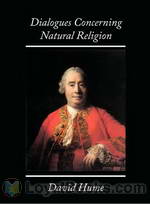 Dialogues Concerning Natural Religion
Dialogues Concerning Natural Religion
In Dialogues Concerning Natural Religion, philosopher David Hume examines whether belief in God can be rational. The work takes the form of a debate between three characters: Cleanthes, who argues that the existence and nature of God can be empirically verified; Demea, who argues that God is completely beyond human knowledge; and Philo, a philosophical skeptic widely thought to represent Hume’s own beliefs. Much of the debate centers around Cleanthes’ presentation of the analogical argument from design... | |
By: David James Burrell (1844-1926) | |
|---|---|
 The Centurion's Story
The Centurion's Story
| |
By: David Marshall Brooks (1902-1994) | |
|---|---|
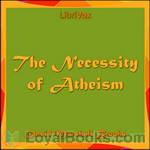 The Necessity of Atheism
The Necessity of Atheism
Plain speaking is necessary in any discussion of religion, for if the freethinker attacks the religious dogmas with hesitation, the orthodox believer assumes that it is with regret that the freethinker would remove the crutch that supports the orthodox. And all religious beliefs are "crutches" hindering the free locomotive efforts of an advancing humanity. There are no problems related to human progress and happiness in this age which any theology can solve, and which the teachings of freethought cannot do better and without the aid of encumbrances. | |
By: David Wright | |
|---|---|
 Is The Young Man Absalom Safe? A Sermon Preached in The Church of St. Mary Magdalene, Stoke Bishop, on Sunday, July 19th, 1885
Is The Young Man Absalom Safe? A Sermon Preached in The Church of St. Mary Magdalene, Stoke Bishop, on Sunday, July 19th, 1885
| |
By: Desiderius Erasmus (1466/69-1536) | |
|---|---|
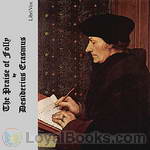 The Praise of Folly
The Praise of Folly
The Praise of Folly (Greek title: Morias Enkomion (Μωρίας Εγκώμιον), Latin: Stultitiae Laus, sometimes translated as In Praise of Folly, Dutch title: Lof der Zotheid) is a satirical essay written in 1509 by Desiderius Erasmus of Rotterdam (1466/69-1536). It is considered one of the most influential works of literature in Western civilization and one of the catalysts of the Protestant Reformation.It starts off with a satirical learned encomium after the manner of the Greek satirist... | |
By: Donald Alexander Mackenzie (1873-1936) | |
|---|---|
 Myths and Legends: Myths of Babylonia and Assyria
Myths and Legends: Myths of Babylonia and Assyria
Donald Alexander Mackenzie was a Scottish journalist and prolific writer on religion, mythology and anthropology in the early 20th century. His works included Indian Myth and Legend, Celtic Folklore and Myths of China and Japan.As well as writing books, articles and poems, he often gave lectures, and also broadcast talks on Celtic mythology.This volume deals with the myths and legends of Babylonia and Assyria, and as these reflect the civilization in which they developed, a historical narrative has been provided, beginning with the early Sumerian Age and concluding with the periods of the Persian and Grecian Empires... | |
By: Dougan Clark | |
|---|---|
 The Theology of Holiness
The Theology of Holiness
| |
By: Dwight L. Moody (1837-1899) | |
|---|---|
 Prevailing Prayer: What Hinders It?
Prevailing Prayer: What Hinders It?
The two first and essential means of grace are the Word of God and Prayer. These two means of grace must be used in their right proportion. If we read the Word and do not pray, we may become puffed up with knowledge, without the love that buildeth up. If we pray without reading the Word, we shall be ignorant of the mind and will of God, and become mystical and fanatical, and liable to be blown about by every wind of doctrine.These Addresses are not to be regarded as exhaustive, but suggestive. This... | |
By: E. (Edward) Anwyl (1866-1914) | |
|---|---|
 Celtic Religion in Pre-Christian Times
Celtic Religion in Pre-Christian Times
| |
By: E. (Elphège) Vacandard (1849-1927) | |
|---|---|
 The Inquisition A Critical and Historical Study of the Coercive Power of the Church
The Inquisition A Critical and Historical Study of the Coercive Power of the Church
| |
By: E. E. Boyd | |
|---|---|
 'Our Guy' or, The elder brother
'Our Guy' or, The elder brother
| |
By: E. H. (Edwin Hubbell) Chapin (1814-1880) | |
|---|---|
 The Crown of Thorns : a token for the sorrowing
The Crown of Thorns : a token for the sorrowing
| |
 Humanity in the City
Humanity in the City
| |
By: E. J. (Edith J.) May | |
|---|---|
 Louis' School Days A Story for Boys
Louis' School Days A Story for Boys
| |
By: E. M. (Ethel Mary) Wilmot-Buxton | |
|---|---|
 Told by the Northmen: Stories from the Eddas and Sagas
Told by the Northmen: Stories from the Eddas and Sagas
| |
By: E. P. (Elijah Porter) Barrows (1807-1888) | |
|---|---|
 Companion to the Bible
Companion to the Bible
| |
By: E.M. Berens | |
|---|---|
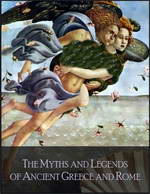 Myths and Legends of Ancient Greece and Rome
Myths and Legends of Ancient Greece and Rome
Silver footed, fair haired Thetis, Ares the God of War, Nike the Goddess of Victory, The Furies and The Muses, Zeus the presiding deity of the Universe and the magical, mysterious Olympus, are some of the amazing, mythical Greek and Roman deities you'll encounter in this book. Myths and Legends of Ancient Greece and Rome by EM Berens was originally intended for young readers. Written in an easy and light style, the author attempts to bring the pantheon of gods into a comprehensible format.... | |
By: Edith Ferguson Black (1857-1936) | |
|---|---|
 A Princess in Calico
A Princess in Calico
| |
By: Edmund Venables (1819-1895) | |
|---|---|
 The Life of John Bunyan
The Life of John Bunyan
| |
By: Edward Burbidge | |
|---|---|
 The Kingdom of Heaven; What is it?
The Kingdom of Heaven; What is it?
| |
By: Edward Carpenter (1844-1929) | |
|---|---|
 Pagan and Christian creeds: their origin and meaning
Pagan and Christian creeds: their origin and meaning
| |
By: Edward N. Hoare (1842-) | |
|---|---|
 A Child of the Glens or, Elsie's Fortunes
A Child of the Glens or, Elsie's Fortunes
| |
By: Edward Sell (1839-1932) | |
|---|---|
 The Faith of Islam
The Faith of Islam
| |
By: Edward Sylvester Ellis (1840-1916) | |
|---|---|
 Through Forest and Fire Wild-Woods Series No. 1
Through Forest and Fire Wild-Woods Series No. 1
| |
By: Edward T. Curnick | |
|---|---|
 The Kentucky Ranger
The Kentucky Ranger
| |
By: Edward Washburn Hopkins (1857-1932) | |
|---|---|
 The Religions of India Handbooks on the History of Religions, Volume 1, Edited by Morris Jastrow
The Religions of India Handbooks on the History of Religions, Volume 1, Edited by Morris Jastrow
| |
By: Edwin Arnold (1832-1904) | |
|---|---|
 The Essence of Buddhism
The Essence of Buddhism
| |
By: Effendi Shoghi (1897-1957) | |
|---|---|
 God Passes By
God Passes By
| |
 The World Order of Bahá’u’lláh
The World Order of Bahá’u’lláh
| |
 Dawn of a New Day
Dawn of a New Day
| |
 The Advent of Divine Justice
The Advent of Divine Justice
| |
 Bahá'í Administration
Bahá'í Administration
| |
 The Promised Day Is Come
The Promised Day Is Come
MANUAL OF SURGERY, OXFORD MEDICAL PUBLICATIONSBY ALEXIS THOMSON, F.R.C.S.Ed.PREFACE TO SIXTH EDITION Much has happened since this Manual was last revised, and many surgical lessons have been learned in the hard school of war. Some may yet have to be unlearned, and others have but little bearing on the problems presented to the civilian surgeon. Save in its broadest principles, the surgery of warfare is a thing apart from the general surgery of civil life, and the exhaustive literature now available on every aspect of it makes it unnecessary that it should receive detailed consideration in a manual for students... | |
 Directives from the Guardian
Directives from the Guardian
MANUAL OF SURGERY, OXFORD MEDICAL PUBLICATIONSBY ALEXIS THOMSON, F.R.C.S.Ed.PREFACE TO SIXTH EDITION Much has happened since this Manual was last revised, and many surgical lessons have been learned in the hard school of war. Some may yet have to be unlearned, and others have but little bearing on the problems presented to the civilian surgeon. Save in its broadest principles, the surgery of warfare is a thing apart from the general surgery of civil life, and the exhaustive literature now available on every aspect of it makes it unnecessary that it should receive detailed consideration in a manual for students... | |
 Citadel of Faith
Citadel of Faith
| |
 Messages to America Selected Letters and Cablegrams Addressed to the Bahá'í's of North America 1932–1946
Messages to America Selected Letters and Cablegrams Addressed to the Bahá'í's of North America 1932–1946
| |
 Messages to Canada
Messages to Canada
| |
 The Light of Divine Guidance (Volume 1)
The Light of Divine Guidance (Volume 1)
| |
 Letters from the Guardian to Australia and New Zealand
Letters from the Guardian to Australia and New Zealand
| |
 The Unfolding Destiny of the British Bahá'í Community : the Messages from the Guardian of the Bahá'í Faith to the Bahá'ís of the British Isles
The Unfolding Destiny of the British Bahá'í Community : the Messages from the Guardian of the Bahá'í Faith to the Bahá'ís of the British Isles
| |
 Messages to the Bahá'í World: 1950–1957
Messages to the Bahá'í World: 1950–1957
| |
 Arohanui: Letters from Shoghi Effendi to New Zealand
Arohanui: Letters from Shoghi Effendi to New Zealand
| |
 High Endeavours: Messages to Alaska
High Endeavours: Messages to Alaska
| |
By: Elihu W. (Elihu Whittlesey) Baldwin (1789-1840) | |
|---|---|
 The National Preacher, Vol. 2 No. 7 Dec. 1827 Or Original Monthly Sermons from Living Ministers, Sermons XXVI. and XXVII.
The National Preacher, Vol. 2 No. 7 Dec. 1827 Or Original Monthly Sermons from Living Ministers, Sermons XXVI. and XXVII.
| |
By: Elisabeth G. Stryker (1856-1936) | |
|---|---|
 Story of One Short Life, 1783 to 1818
Story of One Short Life, 1783 to 1818
This is a brief biography of Samuel J. Mills who was instrumental in establishing the first missionary society in the United States, and also the first Bible Society that began distribution of millions of Bibles around the world. His final mission was to Africa where he helped found what become the country of Liberia. He died on the return voyage at the age of thirty-five. | |
By: Eliza Burt Gamble | |
|---|---|
 The God-Idea of the Ancients or Sex in Religion
The God-Idea of the Ancients or Sex in Religion
| |
By: Elizabeth Cady Stanton (1815-1902) | |
|---|---|
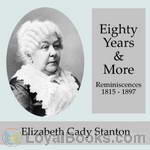 Eighty Years and More; Reminiscences 1815-1897
Eighty Years and More; Reminiscences 1815-1897
Elizabeth Cady Stanton was one of the premier movers in the original women’s rights movement, along with Susan B. Anthony, her best friend for over 50 years. While Elizabeth initially stayed home with her husband and many babies and wrote the speeches, Susan went on the road to bring the message of the women’s rights movement to an often hostile public. When black men were given the vote in 1870, Susan and Elizabeth led the women’s rights establishment of the time to withhold support for a bill that would extend to black men the rights still denied for women of all colors... | |
By: Elizabeth Stuart Phelps (1844-1911) | |
|---|---|
 The Gates Between
The Gates Between
| |
By: Elizabeth W. Grierson (1869-1943) | |
|---|---|
 Tales Of English Minsters: Canterbury Cathedral Kent and Saint Paul's London
Tales Of English Minsters: Canterbury Cathedral Kent and Saint Paul's London
These simple stories of two of England’s greatest cathedrals were originally written for youth but adults will also enjoy them. St. Paul’s Cathedral, London, and Canterbury Cathedral in Kent County are central to the story of England, especially church history though not exclusively so. Here are stories of great spiritual leaders, saints, sinners, politicians, kings, soldiers, murders, pilgrimages, common folks, peoples’ spiritualities, spiritual life, civil life. - Summary by david wales | |
By: Ellen G. White (1827-1915) | |
|---|---|
 Great Controversy
Great Controversy
This great work covers the history of the Christian dispensation, from the fall of Jerusalem, through the Dark Ages and Reformation, to the yet-future final triumph of Jesus over Satan. | |
By: Ellen Gould Harmon White (1827-1915) | |
|---|---|
 Choice Readings for the Home Circle
Choice Readings for the Home Circle
| |
By: Elliott O’Donnell (1872—1965) | |
|---|---|
 Animal Ghosts
Animal Ghosts
Summary: This is a collection of ghost stories in which the antagonists are various animals. Divided up into chapters of ghost sightings by each group of animals, you will hear of hauntings by dogs, cats, birds, jungle animals, etc. (Summary by Allyson Hester) | |
By: Elwyn A. (Elwyn Allen) Smith (1919-) | |
|---|---|
 Men Called Him Master
Men Called Him Master
| |
By: Emily Sarah Holt (1836-1893) | |
|---|---|
 The King's Daughters
The King's Daughters
| |
 Mistress Margery
Mistress Margery
| |
 Our Little Lady Six Hundred Years Ago
Our Little Lady Six Hundred Years Ago
| |
 Out in the Forty-Five Duncan Keith's Vow
Out in the Forty-Five Duncan Keith's Vow
| |
By: Emma Leslie | |
|---|---|
 Kate's Ordeal
Kate's Ordeal
| |
 Sailor's Lass
Sailor's Lass
On a dark and story night, the Coombers find a little girl. Who is she? | |
By: Episcopal Church in Scotland | |
|---|---|
 The Book of Common Prayer and The Scottish Liturgy
The Book of Common Prayer and The Scottish Liturgy
| |
By: Ernest A. Wallis Budge (1857-1934) | |
|---|---|
 Legends of the Gods The Egyptian Texts, edited with Translations
Legends of the Gods The Egyptian Texts, edited with Translations
| |
 The Babylonian Legends of the Creation
The Babylonian Legends of the Creation
| |
By: Ernest Arthur Gardner (1862-1939) | |
|---|---|
 Religion and Art in Ancient Greece
Religion and Art in Ancient Greece
| |
By: Ernest Naville (1816-1909) | |
|---|---|
 The Heavenly Father Lectures on Modern Atheism
The Heavenly Father Lectures on Modern Atheism
| |
By: Ernest Renan (1823-1892) | |
|---|---|
 The Life of Jesus
The Life of Jesus
| |
By: Ernst Lehrs (1894-1979) | |
|---|---|
 Man or Matter
Man or Matter
| |
By: Ernst Wilhelm Hengstenberg (1802-1869) | |
|---|---|
 Christology of the Old Testament: And a Commentary on the Messianic Predictions, Vol. 1
Christology of the Old Testament: And a Commentary on the Messianic Predictions, Vol. 1
| |
By: Eva Lecomte | |
|---|---|
 Paula the Waldensian
Paula the Waldensian
Into the home of an interesting but self-centered family in old France comes Paula, a young orphaned cousin, from the little village of Villar, in the Waldensian Valley. Though living very simply, tending cows, goats, sheep and rabbits, Paula has been brought up to know and love the Lord Jesus and read the Scriptures. Her Lord and His Word are the center of her life, and she can no more keep this good news all to herself than she can stop breathing or eating. This causes a good many complications, for her cousins' home was one where "religion" was a forbidden subject, never to be mentioned, and Paula soon found herself forbidden to read her own precious Bible... | |
By: Evelyn Underhill (1875-1941) | |
|---|---|
 The Life of the Spirit and the Life of To-day
The Life of the Spirit and the Life of To-day
| |
By: F. (Francis) Hodgson (1805-1877) | |
|---|---|
 The Calvinistic Doctrine of Predestination Examined and Refuted
The Calvinistic Doctrine of Predestination Examined and Refuted
| |
By: F. B. (Frank Byron) Jevons (1858-1936) | |
|---|---|
 The Idea of God in Early Religions
The Idea of God in Early Religions
| |
By: F. B. (Frederick Brotherton) Meyer (1847-1929) | |
|---|---|
 John the Baptist
John the Baptist
| |
 Love to the Uttermost Expositions of John XIII.-XXI.
Love to the Uttermost Expositions of John XIII.-XXI.
| |
By: F. G. (Frank Gibbs) Allen (1836-1887) | |
|---|---|
 Autobiography of Frank G. Allen, Minister of the Gospel and Selections from his Writings
Autobiography of Frank G. Allen, Minister of the Gospel and Selections from his Writings
| |
By: F. J. Boudreaux (1821-1894) | |
|---|---|
 The Happiness of Heaven By a Father of the Society of Jesus
The Happiness of Heaven By a Father of the Society of Jesus
| |
By: F. Jewell | |
|---|---|
 Little Abe, or, the Bishop of Berry Brow Being the Life of Abraham Lockwood
Little Abe, or, the Bishop of Berry Brow Being the Life of Abraham Lockwood
| |
By: F. Lamplugh | |
|---|---|
 The Gnôsis of the Light
The Gnôsis of the Light
| |
By: F. Max Müller (1823-1900) | |
|---|---|
 Chips From A German Workshop - Volume I Essays on the Science of Religion
Chips From A German Workshop - Volume I Essays on the Science of Religion
| |
 The Silesian Horseherd - Questions of the Hour
The Silesian Horseherd - Questions of the Hour
| |
By: Fanny Forester (1817-1854) | |
|---|---|
 Effie Maurice Or What do I Love Best
Effie Maurice Or What do I Love Best
| |
By: Flavius Josephus (38?-100?) | |
|---|---|
 Against Apion
Against Apion
| |
By: Forbes Robinson (1867-1904) | |
|---|---|
 Letters to His Friends
Letters to His Friends
| |
By: Frances Alice Forbes (1869-1936) | |
|---|---|
 Life of St. Vincent de Paul
Life of St. Vincent de Paul
Vincent De Paul [c. 1581 - 1660] was a man renowned during his own century for his compassion, humility and generosity. During the days when galleys were part of any countries' war machine and these galleys were rowed by convicts who were in reality slaves, Vincent's special call was to provide what spiritual comfort he could to these wretched men. When a young man he himself had been captured by Turkish pirates, who brought him to Tunis and sold him into slavery, so he had a special understanding of their lot... | |
 Saint Athanasius: The Father of Orthodoxy
Saint Athanasius: The Father of Orthodoxy
A short and rather old fashioned biography a great saint. Don't expect subtlety; it's unapologetic hagiography. The saint is presented as a figure of pristine brilliance, courage and integrity and his persecutors as conniving villains. But to those who appreciate what was at stake in the controversy, Athanasius is indeed a God-sent hero. This is an informative, if quaint, introduction to a fascinating figure in history. | |
By: Frances Browne Arthur | |
|---|---|
 Two Little Travellers A Story for Girls
Two Little Travellers A Story for Girls
| |